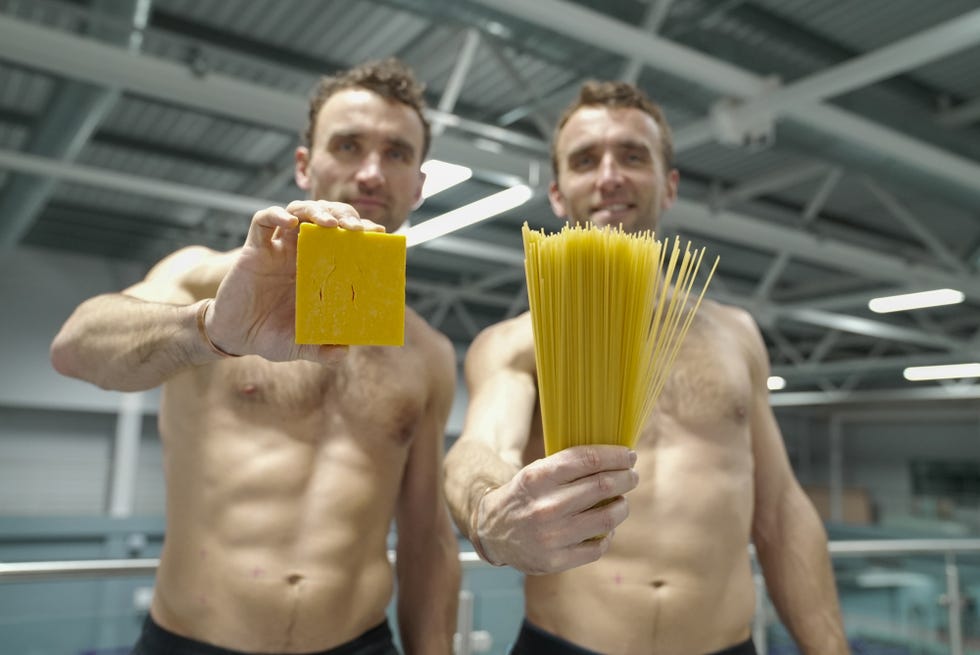Since they last spoke to MH – discussing their omnivore versus vegan diet way back in 2020 – the Turner Twins have been busy.
In fact, moments prior to our conversation Britain’s primo adventurers, 36, learned they’d officially set a world record for flying a tandem electric paramotor at 8,520ft (5,597m) over the French Alps on October 30, 2024.
It’s part of a sustainable energy expedition kick that has seen them sail to the centre of the Atlantic, their boat powered by hydrogen fuel cells in 2022, and last year, launch the world’s first all-electric convertible sports car, which they drove from London to Shanghai over a period of seven months.
Fuel is important to Ross and Hugo. Not just in their vehicles, but how they power themselves. To date, they’ve completed five side by side comparisons – all with the aim of honing their diets and improving their expedition performance. The latest sees them focus in on high fat versus high carb diets.
‘Because we’re twins, doing these sorts of comparisons is always interesting,’ says Ross. ‘But also, how many times do you read that you should do 12 reps and three three sets, and that’s good for you? A lot of people don’t stray from that, but we want to question the status quo, and ask does this really work for you as an individual?’
MH: Who ate what during your 12-week study?
Hugo: I went high fat and Ross went high carb.
Ross: We worked with Thrive and Vivo Life on the food, and Loughborough University where we’d get wired up to machines to measure skin folds and internal body fat readings. We both dropped on the skin fold test over 12 weeks, but the internal fat for Hugo actually didn’t drop as much as mine.
MH: And what exercise were you doing during the experiment?
Hugo: It was very much focused on running, looking at the comparison between aerobic fitness with respect to the diet.
Ross: Alongside some weights and bodyweight exercises, we’d run four or five times per week. We didn’t do this at the same time, but if we both run for half an hour we can meet up, and we did that a few times.
MH: The thinking is that fat is best for cardio fuelling. Hugo, was that your experience?
Hugo: Oddly, the aerobic performance for me almost regressed on the fat diet. I thought I was going to get very lean, but I lost less weight than I expected. The big thing was my training never felt like it was getting better. I don’t have a smartwatch, it was more me asking ‘did I feel good?’. It’s difficult to explain but I knew my cardiovascular fitness was improving, but my muscles felt worse and it was a lot harder, mentally.
MH: Perhaps because you weren’t taking on carbs to refuel the muscles?
Hugo: We did sub-maximal tests at Loughborough, where you run on a treadmill at 9 km/h, with the speed going up every six minute block. After 40 minutes, I was really, really struggling, whereas for the first sub-maximal test before we started this challenge, I was still feeling really good after an hour.
MH: Ross, what was your experience going high carb?
Ross: The limitations of our training without a gym really started showing after the first four weeks, but my calf strength definitely increased; my bent knee calf raise improved by nearly 40%, which is fantastic. I added on 20kg of load. If you’re adding 20kg of force through your calf while you’re running, you’re going to be a lot more efficient.
MH: And what about energy levels?
Ross: I felt like I had a lot more energy. Humans are generally speaking, far better suited to higher fat diets and the science that we’ve done with King’s College London’s Department of Twin Research over the year supports this, but I felt really good. I stripped all butter, dairy, oils, and nuts out of my diet, and I saw a significant improvement in my cholesterol, too.
MH: How will you implement these findings?
Hugo: Everything we do is to make us more efficient on expeditions, so we tweak it based on all of the tests we’ve done over the years. I think we both agree that carbs are better for higher intensity endurance, like 10k up to a marathon – and even programmes like CrossFit – whereas fat is better for multiple day endurance sessions when you’re walking or doing a slow jog.
Ross: Fat is also beneficial on expeditions where you’re carrying your supplies, because it’s more calorific, so you can get more energy from less weight. I think day to day, we’ll go back to a 50/50 split because we’re only running for an hour or so each day, but we’re moving in other ways for hours and hours.
Hugo: I think this test and the vegan diet we did have shown that a little bit of everything goes a long way and what you want is a balanced diet and to eat the rainbow.
Final Stats
Hugo went high-fat while Ross opted for high-carb. The post-trial data suggests strengths and weaknesses to both approaches.
Hugo
- Body mass: 84.2 – 86.9kg (2.7kg difference)
- Fat free mass (kg): 78.0 – 81.0
- Fat mass (kg): 6.2 – 5.9
- Improved his running economy by 2%
- Post VO2 max 8.04 minutes
- Total strength increase: 59%
Ross
- Body mass: 85.0 – 85.2kg (0.2kg difference)
- Fat free mass (kg): 78.6 – 79.6
- Fat mass (kg): 6.4 – 5.5
- Improved his running economy by 4%
- Post VO2 max 9.59 minutes
- Total strength increase: 56%

